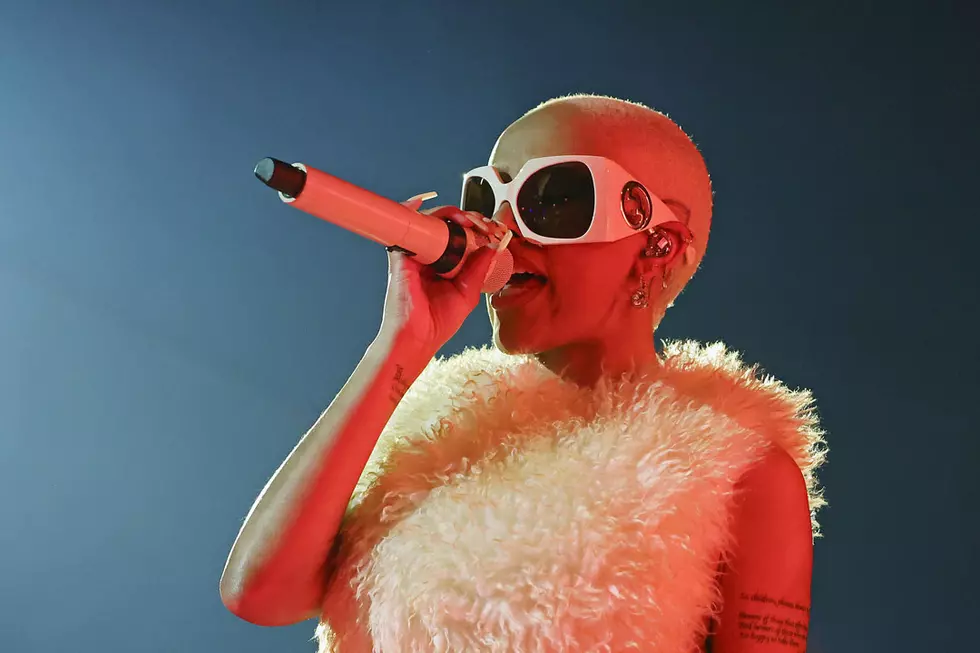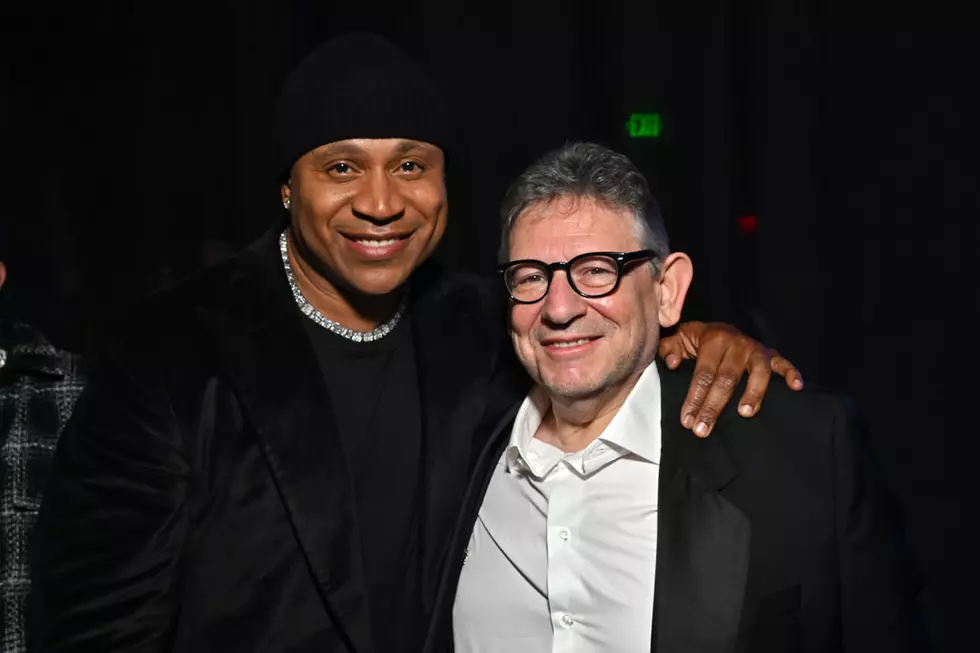
Common Represents Chicago’s Past, Present And Future
Stay True
No matter where he goes in his life and career, Common always comes home to Chicago and hip-hop.
Words Paul Thompson
Images Jeremy Cliff
Editor’s Note: This story originally appeared in the August/September 2014 issue of XXL Magazine.
Lonnie Rashid Lynn Jr., better known as Common, is briefly at peace. Seated at the head of the kitchen table in his grandmother’s sunlit Chicago home, he is enjoying a brief reprieve from a hectic promotional cycle. It’s three weeks before the release of his 10th album, Nobody’s Smiling, a much-anticipated project from Artium Records, which has a joint venture label deal with Def Jam Recordings. Artium is the brainchild of Dion “No I.D.” Wilson, Common’s longtime friend and collaborator. Wilson is the master producer who, in 2011, was named executive vice president at Def Jam. The two met in the fourth grade on Chicago’s infamous South Side, several miles from where Common and his family are now relaxing over an early dinner. Relatives and well-wishers filter in and out, ribbing Common—Rashid to his friends and family—for coming home empty-handed from the recent BET Awards in Los Angeles. But it’s all in good nature, and the atmosphere is the picture of relaxation. There is no showboating, no palpable tension, no politics. Despite the endless slew of radio spots, interviews and photo shoots—not to mention filming both a movie and a TV show—Rashid couldn’t be happier. Running contrary to his new album's title, Common is all smiles: “I don’t know if I’ve felt this excited about an album in a long time.”
If the 42-year-old Chicagoan seems so at peace with his own life, it begs the question: Why the sad album title? As he peers out the window, the smile fades a bit, and the answer presents itself. Over the past several years, Chicago has been vaulted into the national conversation as something of a war zone, violent crime dominating all the city’s national press coverage. The Fourth Of July weekend alone saw at least 16 murders and 82 people shot. In 2013, Chicago was witness to 415 murders, the most in the nation. (For comparison’s sake, New York suffered 333 that year, Los Angeles roughly 250.) That 415 figure was actually a marked decrease from 2012, when 506 Chicagoans were killed. Oftentimes, the parsing of these numbers by mainstream analysts makes the city look safer than it is: It has been pointed out, rightly so, that in 1994 Chicago’s murder count was a staggering 930. But what gross totals don’t account for is how the killings are distributed. “It’s really segregated,” Common explains. “Most of the people you see growing up on the South or West sides are Black.”
And with this marginalization of people of certain neighborhoods, ethnicities and socio-economic status comes dire consequences. As of mid-July, the Chicago Sun-Times reported 209 murders in Chicago; 132, or over 60 percent, have been Black. But for Common and No I.D., the approach is two-fold: address Chicago’s violent underside and help to rebuild, but also to shine a light on the parts of Chicago that aren’t so bleak. “It’s been a bad situation for a long time,” says No I.D. “Maybe it’s worse; maybe it’s just being covered now.”
Common echoes the sentiment: “The majority of the news is going to be about something bleak that’s going on in the world, something that’s not uplifting.” He adds, deflated, “That’s why I don’t look at the news.”
To hear Common speak about Chicago is to hear someone deeply devoted to his hometown. He grew up on the South Side, at 89th and Bennett. “I’m not going to sit here and act like I grew up with seven people sleeping in a room, but at first, when my mother was single, she was always working hard, working two jobs,” he recalls. His mother—the woman pictured with Common on the cover of 1997’s One Day It’ll All Make Sense—was an educator who helped hone young Rashid’s pen. “But it’s funny, man, I never really excelled in music classes,” he notes with a laugh. “I never picked up a saxophone, never picked up a piano. I came from the writing side, and that was my avenue into music.”
That was Dion, who, despite his talent for reading music and aptitude for the piano, only started producing out of necessity. “Being a producer wasn’t a goal in ’85,” No I.D. explains. “It was more like, ‘We like rapping, we like break dancing—we need something to rap and break dance to.’” By the time they rose to prominence with Resurrection (and “I Used To Love H.E.R.”) in 1994, both Common and No I.D. were well on their way to mastering their respective crafts, and Common especially became a revered figure in hip-hop’s underground. From there, his commercial profile steadily rose: After Resurrection and One Day It’ll All Make Sense (along with his 1992 debut, Can I Borrow A Dollar?) fulfilled his contract with New York-based Relativity Records, Common signed to MCA/Universal. It was there that he released his first gold-selling album, 2000’s Like Water For Chocolate. While 2002’s Electric Circus confounded fans and critics alike, Common was unshaken. His next record, 2005’s Be, was released on Geffen Records and Kanye West’s G.O.O.D. Music, and it served as a creative and commercial renaissance.
Since then, Common has vaulted headlong into stardom in the world of entertainment. Scoring movie roles with a litany of Hollywood A-listers—not to mention a starring role in AMC’s period drama Hell On Wheels—Common is now a constant presence on red carpets and marquees from coast to coast. But his motivations remain unadulterated. “I think the biggest inspiration for me is to know [my work] has a higher purpose,” he says. He speaks humbly and effusively about his newest project for the screen, a role as James Bevel in Ava DuVernay’s upcoming Civil Rights drama, Selma. But his real enthusiasm is saved for Nobody’s Smiling: “It’s not just the music; it’s a movement,” he says. “We want to really figure out how to improve people’s lives.”
“I’m a reflection of Chicago, but I’m also a student of Chicago—I wear it with pride,” Common beams. “It gave me authenticity, the ability to be who I am around whoever I’m around.” It’s a demeanor that has served him well throughout his long career and one that he hopes will help him sell his message to his city. “Look, I don’t have all the answers,” he readily admits. “I just want to help. I want to contribute toward it, be a part of that conversation and be a part of that solution. I’m not into making music that doesn’t offer some type of solution. I don’t want to say ‘This is what’s going on in the city,’ and that’s it. I hope I bring insight, something that makes you say, ‘I’m here, in the streets, and I’ve never even thought about it like that.’”
“One of the things we talk about is, ‘Look, we’re from there, we made it to higher ground,’” echoes No I.D. “Us being in this place proves that, you know, there is a chance for those people if a hand is extended out.” And a hand has been extended, in a visual way—the deluxe version of Nobody’s Smiling will come in one of several packages, each with a cover that features a different artist from Chicago. It’s a platform for up-and-comers from Lil Bibby, Lil Herb and King Louie to Dreezy, G Count and KD Young Cocky, as well as someone even younger: “We have this little youngin’ named Johnny. He’s only like 10 years old,” Common marvels. “He was doing the spoken word at the beginning of [lead single] ‘Kingdom.’ We didn’t end up using it for the final [cut], but he’s a little artist himself.
"All those people represent Chicago. They represent where I come from,” he continues. “We know what this city is. We know the struggles it has; we know the beauties it has, too.” Nobody’s Smiling reflects this attitude thoroughly and with a sharp eye for detail and character. There are roads into the psyches of young Chicagoans (opener “The Neighborhood” is an especially incisive portrait), but there are also celebrations of people old and young, friends and archetypes. “Hustle Harder” celebrates female independence: closer “Rewind That” sports perhaps the most poignant tribute to the late J. Dilla. Common and No I.D. have successfully crafted an album for the times, both sonically and politically.
From the table in his grandmother’s kitchen, Common’s passion for the next generation of rappers is readily apparent. Over dinner, when asked about what initially drew him to Long Beach up-and-comer Vince Staples—who also appears on “Kingdom” and is signed to Def Jam—Common launches into full rapper mode. There are the broad strokes: Staples has a unique point of view, a sense of soul, even a great voice (for which Com cites Guru, of course). But what really sells Staples is his inventiveness when it comes to rhyme patterns, a point Common drives home by freestyling a series of four-bar sets, pointing out where the rhymes would naturally be—and what words were likely to fill those spots. Only a few minutes later, he is back to speaking lucidly about the socioeconomic strata in his city: “I grew up in the mix of the people—people that had more difficult situations than me financially, but also more difficult situations from a family standpoint.” This is Common—master craftsman, agent for social change. And now, with Nobody’s Smiling on the horizon, he feels his timing is finally right.
“Somebody said to me very recently, when they heard the album, that this is the first album I’ve made that feels really present,” Common says, pleased with the assessment. “It’s not on a classic hip-hop tip, it’s not ahead of its time. This is now music.”
Related: Review: Common Sheds More Light On Chicago With Nobody’s Smiling
Common Thinks Chicago Is A War Zone Right Now
Common’s All-Time Favorite Kanye West Beats
Common’s Mount Rushmore For Rappers And Producers
More From XXL









